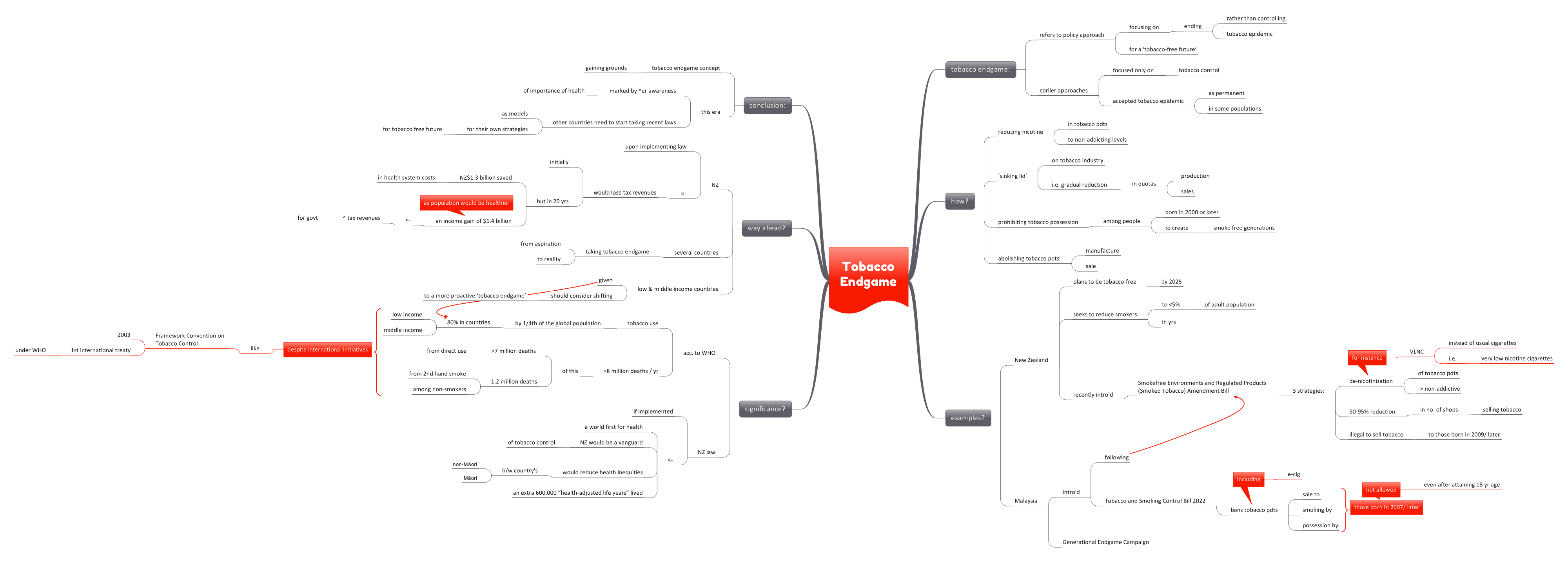Tobacco Endgame

What is tobacco endgame?
- The concept of tobacco endgame refers to a policy approach that focuses on ending the tobacco epidemic, rather than usual tobacco control policies.
- The earlier strategies largely focused only on ‘tobacco control’, which accepted that tobacco epidemic is permanent in some populations.
- However, the concept of tobacco endgame aims for a ‘tobacco-free future’.
How is it done?
A number of strategies are used:
- Reducing the nicotine content in tobacco products to non-addicting levels
- Use of a ‘sinking lid’ on the tobacco industry, i.e. gradual reduction of sales and production quotas
- Prohibiting tobacco possession by persons born in 2000 or later– to create smoke-free generations
- Even abolishing the manufacture and sale of tobacco products
How are countries working for a tobacco endgame?
New Zealand
- New Zealand had earlier declared plans to be tobacco-free by 2025. Towards this goal, it recently introduced the Smokefree Environments and Regulated Products (Smoked Tobacco) Amendment Bill.
- Under this bill, it uses 3 key strategies:
-
- De-nicotinization of tobacco so that it is no longer addictive, for instance, VLNC (very low nicotine cigarettes) instead of the regular cigarettes
- 90-95% reduction in the shops that can sell tobacco
- Creating ‘smoke-free generation’ by making it illegal to sell tobacco to those born in 2009 or later
- The country seeks to reduce smoking prevalence of less than 5% of adult population within years.
Malaysia:
- Following New Zealand, Malaysia introduced the Tobacco and Smoking Control Bill 2022– another example of tobacco endgame.
- The country is considering a ban on sale of all tobacco products (including e-cigarettes) to those born after 2007.
- Such persons won’t be allowed to smoke or even own tobacco products, even after attaining the age of 18 years.
- The country is also using the ‘Generational Endgame Campaign’ to reduce the number of smokers and curb tobacco addiction.
Why is it significant?
- According to WHO, tobacco use leads to over 8 million deaths every year. Of this, over 7 million deaths result from direct use while the remaining 1.2 million deaths are of non-smokers who were exposed to 2nd hand smoke.
- 1/4th of the global population use tobacco. More than 80% of these users live in low and middle income countries.
- This is despite international initiatives like the Framework Convention on Tobacco Control, 2003– the 1st international treaty negotiated under the WHO.
- If implemented, New Zealand’s Tobacco Endgame Law will be a world first for health. The country would leapfrog others and become a vanguard of tobacco control.
- The law is expected to reduce the Māori and non-Māori health inequities in the country. The overall strategy is expected to result in an extra 600,000 “health-adjusted life years” lived.
What is the way ahead?
- While New Zealand would initially lose tax revenue from tobacco sales, it would avoid NZ$1.3 billion in health system costs over the next 2 decades.
- The improved health of its population would translate into an income gain of $1.4 billion. Consequently, the government would see more tax revenue.
- Several countries have started taking the concept of tobacco endgame from aspiration into reality.
- Given how the tobacco epidemic is especially prevalent and harmful in the low and middle income countries, such countries should consider shifting strategies to a more proactive ‘tobacco endgame’ too.
Conclusion:
The concept of tobacco endgame is gaining grounds among the policymakers of New Zealand and Malaysia. In an era, marked by heightened awareness of the importance of public health, other countries should start taking the recent legislations as models for their own strategies for a tobacco-free future.
Practice Questions for Mains:
Evaluate the advantages and challenges of a tobacco endgame strategy. Is such a strategy better suited for a country like India? (250 words)
If you like this post, please share your feedback in the comments section below so that we will upload more posts like this.


